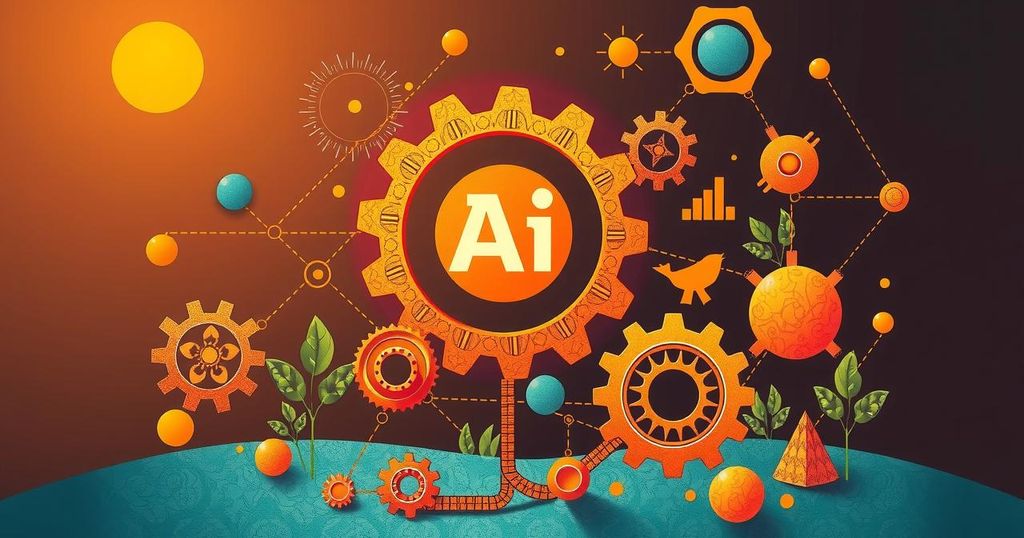Democratize AI or Face an Inevitable Oligarchy
Artificial intelligence is at a critical turning point that could reshape work and welfare systems. To fend off a future dominated by corporate power, democratization of AI is essential. This means rethinking ownership and usage of AI technology, ensuring it serves the many rather than the few. A reimagined welfare state is equally necessary to provide purpose and security in an evolving job market.
Artificial intelligence is pushing us toward a fork in the road, prompting a necessary rethink of how we work and how our welfare systems are structured. The option of letting corporations dictate this future is no longer viable. While the familiar slogan “socialism or barbarism” feels overused, it hints at an ongoing battle for a fairer economy — a battle that, more often than not, the ruling class has chosen to sideline in favor of chaos.
Despite historical struggles, new movements are emerging, reflecting a shift in how we address control over capital and workplaces. AI stands as a vital example. We find ourselves teetering on the edge of an oligarchic society, and it’s crucial to intervene before this potential power solidifies. The current landscape presents both promise and peril, raising critical questions about who will ultimately control Artificial Intelligence, and to what effect.
The optimistic angle here is that the very technology of AI could be wielded for the benefit of workers if we manage to harness it correctly. There’s a longstanding Marxist belief that mechanization could free workers, but the ownership of these technologies raises red flags. Right now, most AI advancements favor capitalists over the general populace. But here’s the kicker — it doesn’t have to remain that way. The big question remains: who will take charge of AI development?
If the forecasts of tech leaders bear out and AI transforms our workplaces to a near-scarcity-free existence, democratizing this tech becomes vital. Otherwise, we risk further entrenching a society that benefits a select few. We need to think about how ownership and usage of this technology could reshape welfare systems. A radical rethink might just be what’s needed to secure a future that doesn’t just push for productivity but also guarantees dignity and security for those whose jobs get displaced.
As we dive into these murky waters, some key considerations arise: Who should guide AI’s development? Should we focus on efficiency and output, or should jobs lost lead to creativity and empowerment? This pivotal transition in AI isn’t unprecedented, but reminiscent of the industrial upheaval seen in past centuries. Yes, change is daunting, but it also opens doors to new possibilities if approached correctly.
Imagining a socialist economy where workers have a say means communities could dictate the pace and purpose of AI advancements — a more humane approach. A planned effort would soften the blow of this transition rather than leaving it to chance or corporate whims. However, in discussing the use of AI, there’s a fine line between augmentation and genuine enhancement.
Evgeny Morozov explores this in
le Monde Diplomatique, emphasizing that augmentation can diminish our abilities, while enhancement nurtures true potential. As Morozov notes, the capitalist class might prefer deskilling workers to maintain control — but in a worker-driven scenario, the focus could shift toward empowering communities through meaningful engagement with AI. This raises the stakes: How do we fashion a welfare state that ensures purpose as much as security in an era of shrinking jobs?
Right now, there’s a rising concern about the tech elite’s vision for AI-led disruption, which often involves a stripped-down version of a universal basic income (UBI). This minimalist approach risks transforming social welfare into a market-driven nightmare. UBI could serve as a band-aid, ultimately leaving those in need worse off. It’s a troubling scenario, with proponents suggesting that solutions like UBI could dismantle current welfare systems altogether, leaving the most vulnerable exposed.
With AI’s presence in industry growing steadily, a retreat into complacency is not an option. Yes, we need to be realistic about what AI can and can’t do, but we also should view this as a crucial moment for re-imagining both AI governance and our welfare systems. Let’s seize this moment and push for a future where AI truly serves the many — not just a privileged few — and cultivate a society that thrives on collective strength and purpose.
The evolution of AI technology presents both opportunities and risks. To avoid an oligarchic future, a democratization of AI is essential. This means rethinking who controls these technologies and how they’re used. Moreover, we must ensure that the welfare state adapts to this reality, redistributing not just resources but purpose and meaning in an era of diminishing traditional jobs. The call for a collective approach to AI development has never been more urgent.
Original Source: jacobin.com




Post Comment